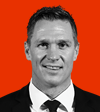Private investment is a game-changer for South African teams, writes former Springbok captain JEAN DE VILLIERS in the latest SA Rugby magazine.
ALSO READ: What’s in our new issue?
The Vodacom Bulls and Sharks have struck out in a bold direction by partnering with private investors and will reap the short- and long-term benefits in the years to come. The Lions and Stormers, however, may fall further behind their forward-thinking counterparts.
Consider how the Bulls have turned things around since businessmen of the calibre of Johann Rupert and Patrice Motsepe acquired a controlling stake in the franchise.
A substantial financial injection led to a restructure of the administration and the coaching team. Jake White, who specialises in long-term rebuilds, was given the backing to revive a sleeping giant.
Top players opted to stay in Pretoria. The Bulls won the Super Rugby Unlocked tournament and then finished the league stage of the Currie Cup at the top of the table.
Springboks who had long featured in Europe, such as Marcell Coetzee (Ulster) and Francois Hougaard (Worcester) were encouraged to return and join the revolution.
One would expect a similar uprising on the east coast in the not too distant future. In January, MVM Holdings, an American consortium that was initially interested in acquiring Western Province, bought a controlling stake in the Sharks.
Plans are afoot to recruit more star players and to boost the development of the game in the region. MVM also hopes to open academies in the Eastern Cape – a move that could unearth more rough diamonds, like Makazole Mapimpi, and benefit the national team and the Sharks.
These are encouraging developments. Most players are looking for financial security and may view a stint at the Bulls or Sharks as a more attractive opposition. And if top players are well compensated at home, they may be less inclined to accept a deal with a top club in Europe.
Some people have expressed their concern about private equity and have warned the franchises about selling their brands cheaply – as was the case when MVM offered the Stormers the equivalent of R100-million for a controlling stake in the Cape Town-based franchise.
That number, of course, represents the starting point for investors. From what I understand, the investors will continue to pump money into the franchises.
These investors will bring a lot more than money to the table, though. Many of them boast strong relationships with top clubs in Europe and the US. Among the MVM consortium, there are many captains of industry with valuable networks and extensive expertise.
The Bulls and Sharks must harness those networks to promote their brands. They must think outside the box. While team performances are the priority, there are other goals to consider.
How can they develop players at every level? How can they improve the fan experience and ultimately fill the stadiums again? Even before the Covid-19 pandemic, a number of teams were struggling to draw spectators to the grounds.
The investors at the Bulls and Sharks will bring a lot of expertise to the party, and will draw on their contacts and networks around the world to find a solution. In short, both set-ups will become more professional.
Two years down the line, the Bulls and Sharks will lead South African rugby. The gap between these teams and the chasing pack will grow more substantial with time.
SA Rugby has to ensure there is alignment, though, between the governing body and the individual teams. We don’t want another situation where the franchises have more power than the national union – as is the case with some clubs in England and France.
SA Rugby has done an admirable job to keep the ship afloat, but there’s no getting around the fact that the local teams face significant financial challenges and are in dire need of assistance. It would be great to see more investors coming on board and putting money into the other franchises.
That would ease the strain and encourage more of our top players to remain in the country. It would ensure more of the best players feature in our local tournament and it would certainly improve the local product.
Photo: Steve Haag/Gallo Images





